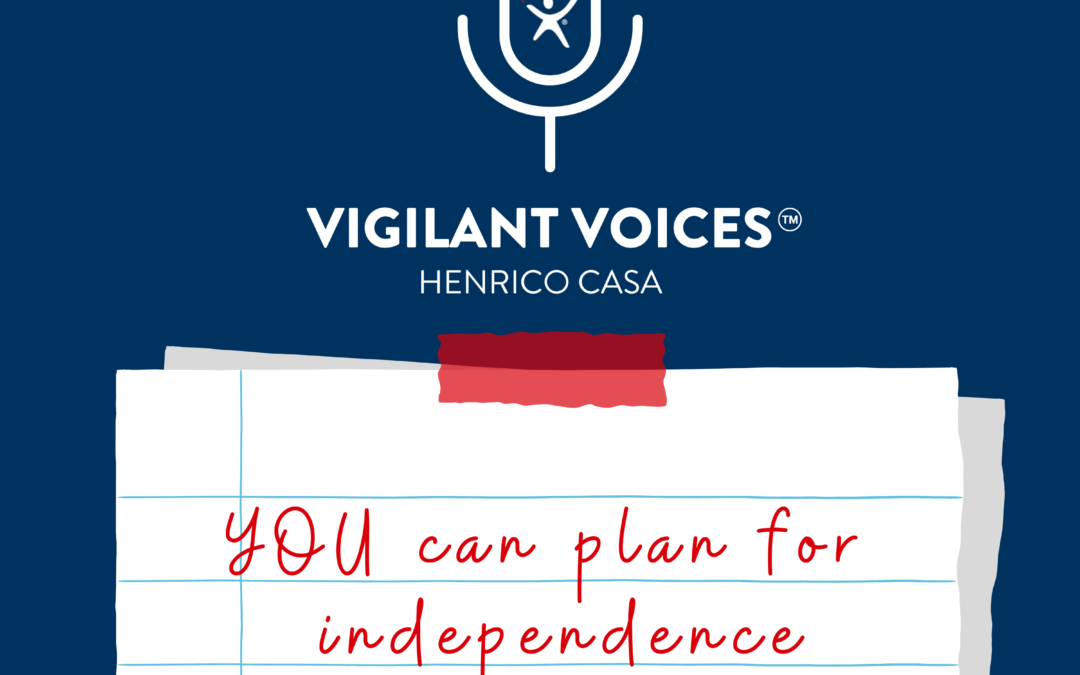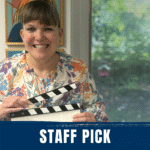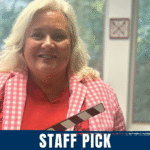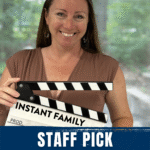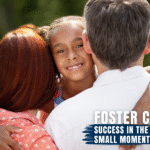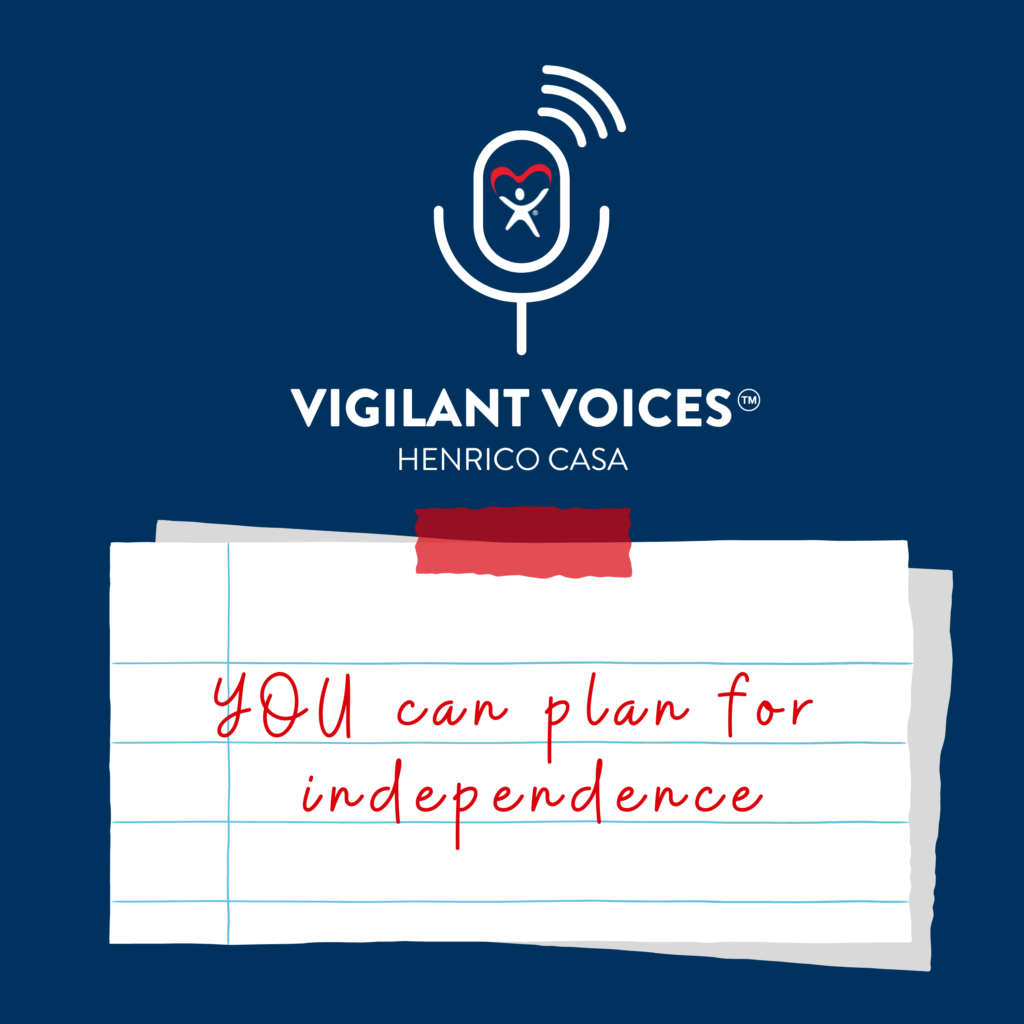
Listen to Episode 9 of the Vigilant Voices™ podcast, YOU Can Plan for Independence.
Jeannine Panzera: Hello, listeners. We’re glad to have you listening and hope that your summer is off to a great start.
Kristin Blalock: Yeah, the kids are out of school, which hopefully means you’re having some fun. But in our work, we’ve learned that sometimes the summer is actually more active in terms of abuse and neglect because the kids home and their home in what could maybe not be an ideal situation without the safety net of school.
J: Exactly. Which is why we continue to want everyone out there who’s listening to know about the challenges facing children and families so that we can all be helping to ensure no child continues to face abuse, neglect, or trauma. And that’s what this Vigilant Voices™ podcast is all about. It is. And this episode is actually dropping on July 4.
K: Independence Day. So you know how I kind of like to look up definitions and kind of sit on what a word means. And so, of course, I looked up independence, and it’s defined as free from outside control or not depending on another for livelihood, which obviously applies to the history of our July 4 holiday.
J: Most definitely. But now that you say that, it also applies to the older youth that we work with at CASA, and especially those that are, unfortunately, aging out of the foster care system.
K: Yes, that’s exactly where my mind went as well. And the question I’d love for us to discuss today is what do children or teens, especially those with traumatic backgrounds, need for independence?
J: We run into this often at CASA because we typically work with teenagers that are about to age out of the foster care system. Our hope, when we believe that this may occur, is that we are trying to prepare them as much as possible for life as an adult, which can be extra challenging, knowing that they may not have that solid foundation or access to support systems like our other children may have.
K: Yes, and this sounds a lot like a teenager we’re actually currently serving .I’m going to call him Axel. But Axel was raised by his biological parents who had a long history of substance abuse issues, and his childhood was full of emotional abuse that wasn’t reported until his teenage years. So at that time, as a teenager, he was removed from his home and moved into a foster home.
J: Yeah, and unfortunately, this case and the issues for Axel was going on for so long without anyone knowing. And we can’t expect youth to be prepared for their future independence when all they’re thinking about and what is consuming them is basic survival, day today, right now, in the present. And we know that it’s not until a child has their baseline needs met that they can even look ahead to prepare or even dream about what a future might look like for them.
K: Right. And not to mention that there are a million things that teenagers need before they can be independent. If I let myself, I could lose sleep over this because my kids are getting closer to that. And I’m always thinking of more and more things that I need to teach them before they’re off on their own, which is what I want for them to be off on their own, thriving, with a sense of purpose and confidence and just being a successful adult.
J: And I know you and know that you’re not talking necessarily when you say success like a career path, You’re talking about success in terms of making good decisions, taking care of their own needs, having healthy relationships. All of which is part of our fun term of adulting.
K: Right. But be a good person, please. We need to be so intentional about setting children up for the future. Especially when you think about teens aging out of foster care who don’t have a support system. The data paints a really uphill battle for them. Less than half will graduate from high school. About three out of four girls who age out of foster care are pregnant by 21. And then you look at things like homelessness and incarceration, which are also really prevalent.
J: Yeah, and we’ve talked a little bit about how I feel for these kids, but we really have historically just failed them. And some listeners may know this, others may not. But Virginia is unfortunately one of the worst states for youth aging out of foster care without any type of permanent connection. And this accounts for about 20% of the total number of children in foster care in Virginia. And the data shows that these youth are less likely to go to college, have poor workforce outcomes, and like you mentioned, they have higher rates of incarceration.
K: There’s just so much that can and should be done. But on the positive note, where there are needs, resources emerge. So so many resources come to mind locally. I’m thinking of organizations like Fostering Acadia that offer independent living arrangements and car incentive programs. I’m thinking of the Great Expectations program associated with community colleges that help students transition into their post secondary education. Then there’s organizations that popup like Worthdays, and they’ve actually started offering cooking lessons, which is amazing.
J: These are all so great. And an example of how we do need government and policies that are looking at and focusing on these. But then we really do need the schools and nonprofit organizations and faith based communities to all be involved in these efforts.
K: Yeah, there’s definitely no shortage of needs. And we all have a part to play at the government and community level, but also on an individual level.
J: And this conversation is actually reminding me of one of our earlier episodes, I think maybe our second one, when we talked about advocacy and the different types. And there are levels and one type is about our systems and systems advocacy.
K: Yes. And another type is individual advocacy. How can we, every single individual listening, be a voice for teens aging out of the foster care system? And how can we set them up for success as they transition into adulthood? What are some tangible things that we can do as individuals?
J: And to me, when I think about this, I think of this and a really great way is to brainstorm different ways that you can offer support that enhances some of those what we would call macro level programs that are out there.
K: Yeah, great point. So in terms of education, we know that there are programs that offer financial support for tuition. But then when you brainstorm around that, you think about a teen on their own embarking into the world of higher education. What else could they need? Maybe they need support purchasing books or a gas card to get to class. A study buddy. Can you help with that? We could offer child care so that they can participate in person at classes and maybe we help make sure they have good WiFi access. It’s these simple things that all together support education.
J: Right. And those might seem obvious for some of us, but then something else is networking opportunities. I mean, these teens unfortunately don’t have social capital. They don’t have circles of family, friends, or maybe professionals in their life to help make those introductions and open doors and help them find jobs. We know that networking is key. So maybe you can share your network with some of these youth, your banker, your mechanic, your doctor. Help give them a network to build from.
K: Yeah, definitely. That’s a part of yourself that you can share with them.
J: Exactly. Almost serve as a pseudo mentor in some way. And that really is one of the best ways to help our teens that are aging out of foster care be that mentor and a role model. There are so many skills that they need to learn as they move into adulthood. We all had to learn these things. And many of them may not have been modeled in a healthy way, unfortunately, by the adults that were in their lives, but communication skills and conflict resolution, helping them establish credit or just how to act in the workplace, like what’s the proper etiquette?
K: Right. Which is hard to learn if you’re not seeing it modeled in front of you. And it seems like as we’re talking, it’s sort of the soft skills that we can help with as individuals. Because you think of an employment program, it could help someone find a job, but how is that teenager going to keep that job? Is someone encouraging them to get along with their coworkers? To be on time, to ask for a raise in the appropriate way. It’s all this stuff that comes along with a job that if you don’t have adults to call for help or advice, you don’t know what to do.
J: That’s just so true. And there is just so much that each of us need to learn as we transition into adulthood. And this is, like I said, I have a soft spot for these teens, because I hate that there are teens navigating life without being able to have that stable adult modeling the things that they need to learn to be successful.
K: I agree. And that brings us back to Axel. He’s not quite 18, but when he turns 18 he will join the Fostering Futures program which will allow him to continue receiving support from DSS over the next few years. Until then, he is learning so much from his foster mom. She has been working with him on budgeting and other independent living skills. All the while, his CASA has been working with him on his career goals. Axle’s current goals are the find a job, get his driver’s license, and save up to buy a car.
J:Seeing Axle set goals shows me that his needs are being met in the present, so much so that he’s already planning for his future. Teens like Axle benefit so much from having an adult to call, someone they know if rooting for them.
K: Definitely. They just don’t have any kind of security net.
J: Things will go wrong. We’ve all made mistakes and needed help. These kids are in a situation, through no fault of their own, where they don’t have family or consistent adults in their life to just be there for them. There isn’t a fall-back plan for them as they go into adulthood.
K: They don’t have someone to call for a little extra cash, for a little advice. They don’t have a home to go home to when things are tough and they need a little encouragement.
J: They don’t have a soft place to land.
K: Oh, yes. That really sums it up. Let’s make that our call to action. Listener, be a soft place to land.

